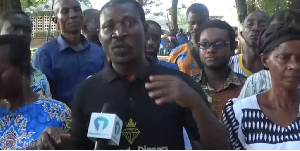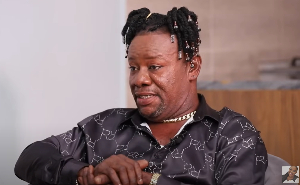By Cindy Swirko
Published: Wednesday, April 28, 2010 at 7:24 p.m. Last Modified: Wednesday, April 28, 2010 at 7:24 p.m.
State Attorney Bill Cervone told a group of University of Florida students Wednesday it will probably be at least 30 days before he makes any decisions on how to proceed with the case of UF graduate student Kofi Adu-Brempong, who was shot by UF police in March.
Cervone said a Florida Department of Law Enforcement report on the incident is several inches thick and he added that Adu-Brempong's attorney has information to share. Cervone said it will take time to thoroughly review all of the materials.
"I can already tell you there are some obvious areas of follow-up from the law enforcement side," Cervone told the students. "I know there are areas of follow-up from Kofi's lawyer's side."
Cervone said that 30 days "is nothing more than a guess, but I would hope in another 30 days we would have a pretty good picture as to where we are going."
Adu-Brempong, a 35-year-old grad student from Ghana, drew attention when he began behaving in what was described by a professor as a delusional manner.
On March 1, authorities talked to him and opted against taking him to a facility for an involuntary mental evaluation, according to a police report. On March 2, a neighbor called 911 to report hearing screams from Adu-Brempong's Corry Village apartment.
Police spent about 1 1/2 hours trying unsuccessfully to get him to come out. Several officers entered his home and found him sitting on the floor with a knife and metal rod, the report states. Adu-Brempong stood up and approached police with the rod. Attempts to stop Adu-Brempong with Taser and beanbag shots were unsuccessful so an officer fired his gun, hitting Adu-Brempong in the face.
Cervone said a Florida Department of Law Enforcement report on the incident is several inches thick and he added that Adu-Brempong's attorney has information to share. Cervone said it will take time to thoroughly review all of the materials.
"I can already tell you there are some obvious areas of follow-up from the law enforcement side," Cervone told the students. "I know there are areas of follow-up from Kofi's lawyer's side."
Cervone said that 30 days "is nothing more than a guess, but I would hope in another 30 days we would have a pretty good picture as to where we are going."
Adu-Brempong, a 35-year-old grad student from Ghana, drew attention when he began behaving in what was described by a professor as a delusional manner.
On March 1, authorities talked to him and opted against taking him to a facility for an involuntary mental evaluation, according to a police report. On March 2, a neighbor called 911 to report hearing screams from Adu-Brempong's Corry Village apartment.
Police spent about 1 1/2 hours trying unsuccessfully to get him to come out. Several officers entered his home and found him sitting on the floor with a knife and metal rod, the report states. Adu-Brempong stood up and approached police with the rod. Attempts to stop Adu-Brempong with Taser and beanbag shots were unsuccessful so an officer fired his gun, hitting Adu-Brempong in the face.
The case has created concern among some UF students and staff, who believe police acted inappropriately in shooting Adu-Brempong and in charging him with aggravated assault. Some also contend the shooting could have been avoided had UF Baker-acted Adu-Brempong on March 1.
Cervone met with more than a dozen students around a picnic table under an oak tree on campus in what resembled a hour-long civics lesson on various laws, the grand jury process, Cervone's obligations, the number of officers who have been prosecuted by Cervone and other factors.
Cervone said he could not legally or ethically discuss details of the case but did answer questions about the process he will follow.
He was pressed by student Sharon Burney on whether race could play a role in the case -- Adu-Brempong is black and the officers were white.
"There is no law for a police officer who has demonstrated cultural insensitivity in the past in interacting with people of different ethnicities?" she asked.
"Cultural insensitivity is not a crime," replied Cervone.
Students said afterward they believed the meeting with Cervone was helpful in clearing up some misconceptions and in giving them a forum to get their points across.
Diaspora News of Thursday, 29 April 2010
Source: The Gainsville Sun
















